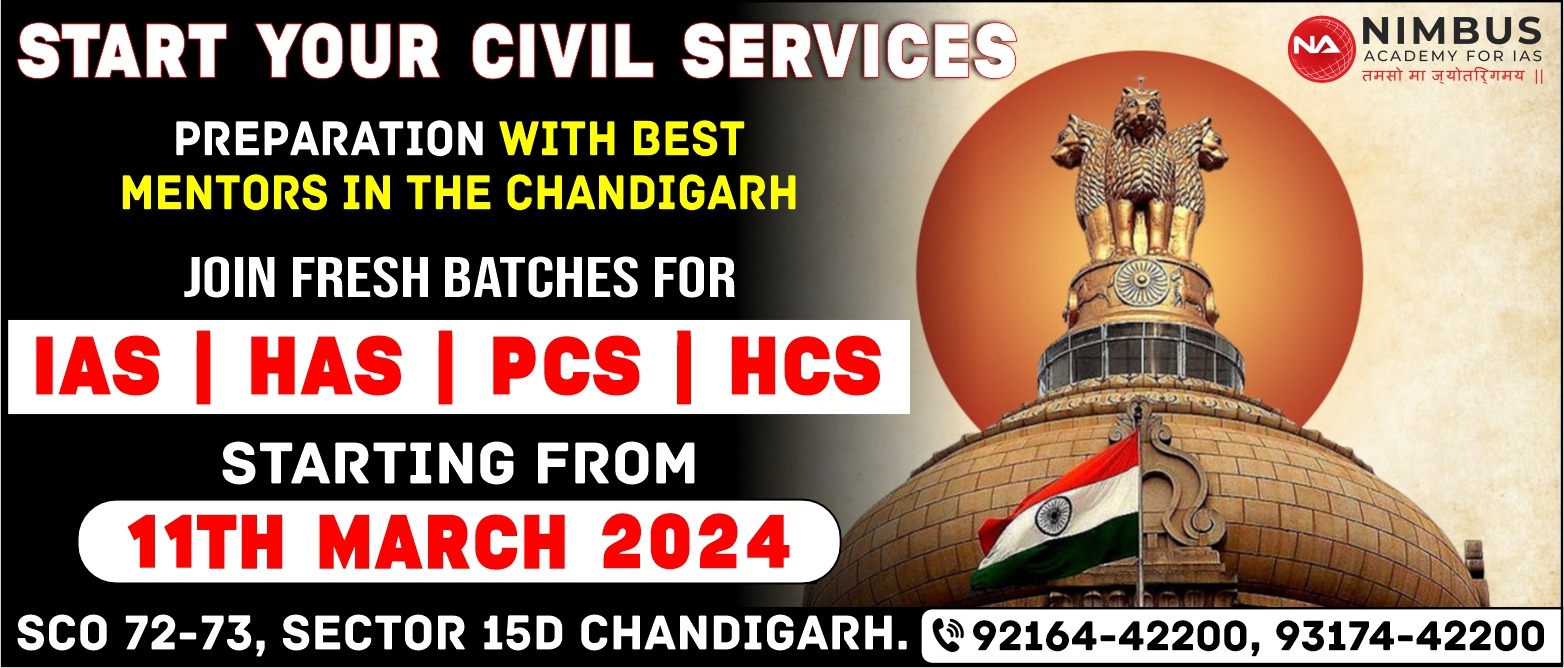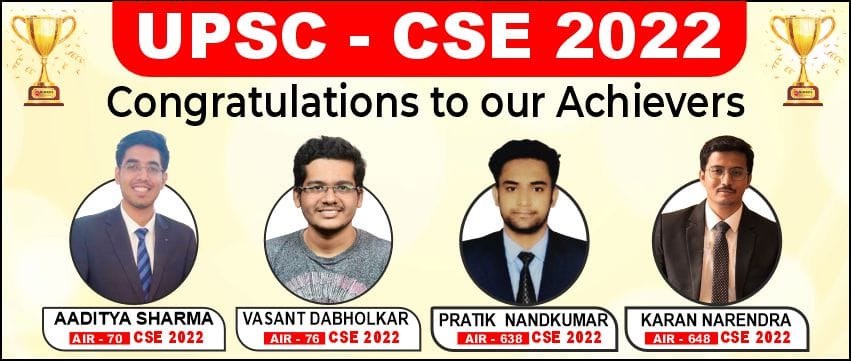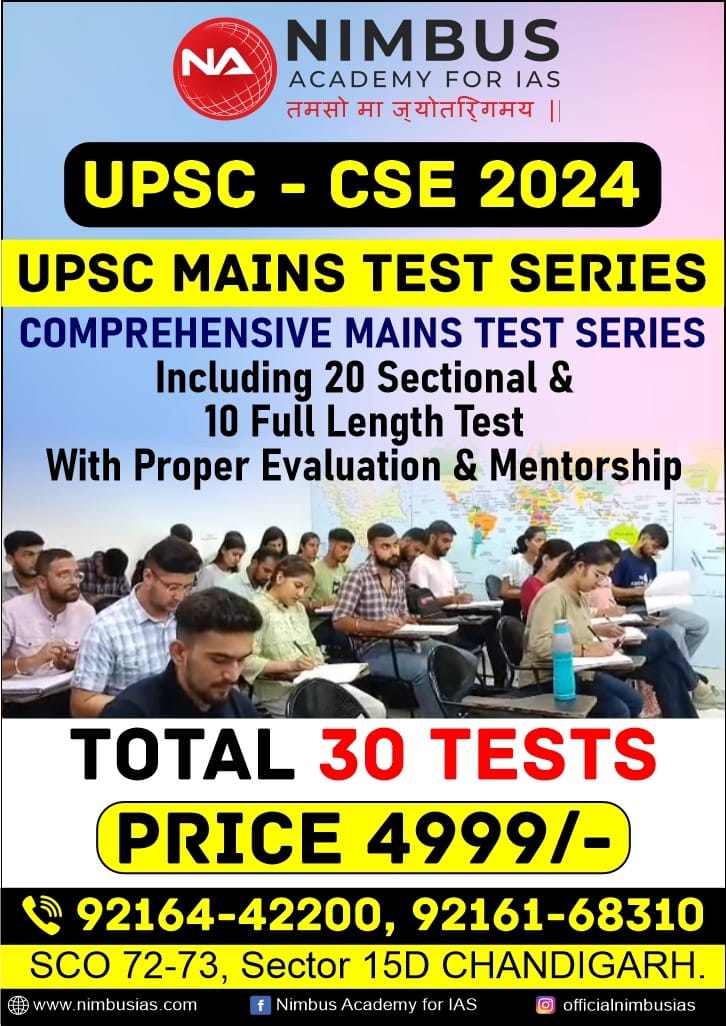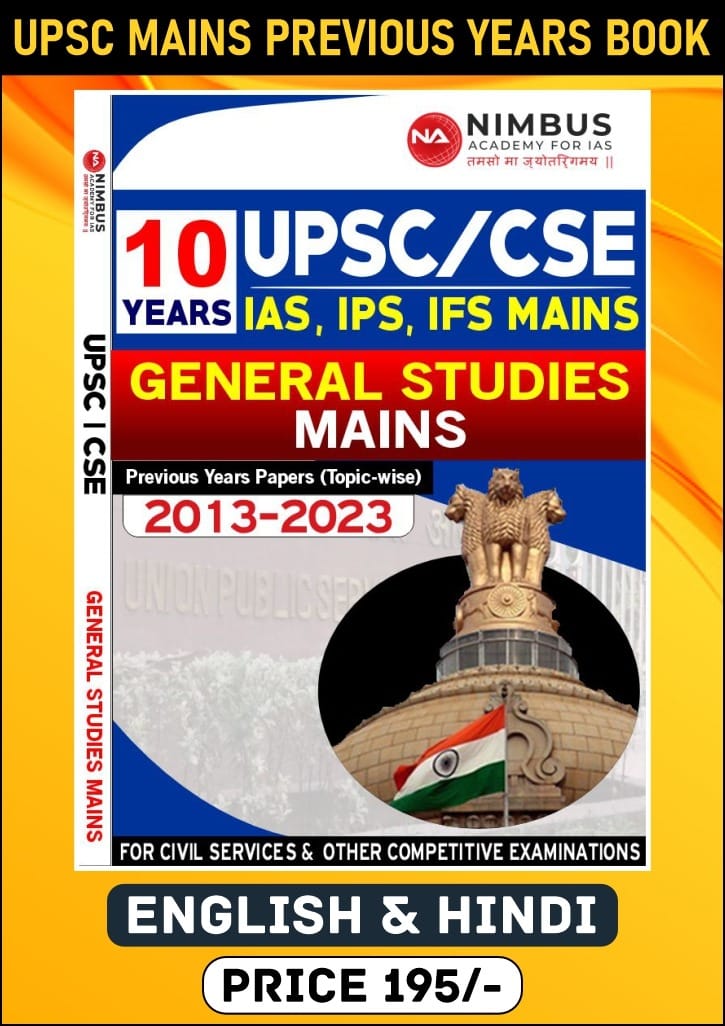Best IAS Coaching in Chandigarh | Top IAS Academy in Chandigarh
Top IAS Coaching in Chandigarh for UPSC CSE 2024-25 Batch. Committed to addressing the need of the hour, Nimbus Academy is the best Institute for IAS Coaching in Chandigarh has taken up the mission of providing top class IAS coaching in Chandigarh.
Best IAS Coaching in Chandigarh
The city beautiful with its serene and tranquil ambience provides a near-perfect atmosphere for pushing one’s mental limits during civil services preparation in Chandigarh. Aspirants from the northern region can now make best use of their invaluable time by seeking guidance from this institute which provides inarguably the best IAS coaching in Chandigarh.
UPSC Coaching in Chandigarh
Nimbus Academy for UPSC Coaching in Chandigarh provides quality education through learned and experienced faculty where individual attention is given to each and every student. Also, state services’ aspirants are provided coaching in this institute.
So if you want the best IAS coaching in Chandigarh, your search ends here.
Top Civil Services Coaching in Chandigarh
Indian Administrative Service, commonly known as IAS, is the top ranked government service in the country. Becoming an IAS is a dream and passion for many and to fulfil this dream lakhs of IAS aspirants prepare for the Civil Services Examination every year.
Are you also preparing for the CSE examination and looking around for IAS coaching in Chandigarh?
If yes, we are here at Nimbus Academy for IAS Coaching in Chandigarh to help you out with a few things that you should keep in mind while taking IAS coaching.
IAS Academy in Chandigarh
Some people also prefer self-study while preparing for IAS, but let us tell you that taking IAS coaching in Chandigarh can really be life changing for you. A proper routine UPSC coaching in Chandigarh will help you maintain the routine and follow the discipline which you have been procrastinating for a long time.
So what are you waiting for? Look around and find a suitable IAS coaching in Chandigarh for you!
Why Civil Services is a best career options?
Civil Services is the permanent services responsible for administration in Government. It is sought to be the most Prestigious career among students. UPSC is the backbone of administrative machinery of the country.
Civil Services provides bondless scope to work for public welfare and Opportunities to learn new skill sets. UPSC give the apportunities to work in variety of organisation like Indian Administrative Service (IAS), Indian Police Service (IPS) and foreign Services (IFS) and many other services.
How to start Civil Services Exam preparation?
If a student has decided to prepare for UPSC/CSE, then there should be strict road map to prepare for this exam. So there are some of the steps, one should follow to get success in this field.
Step I: Why you want to join Indian Administrative Services?
If your why is clear then, it will become very easy. Every student has different reasons to choose this career. Some like status, some like power, some like money and other perks, some like to work for society welfare. So you should be very clear that what is your reason to make this as your career goal.
Step II: Who can prepare for Civil Services Exam?
Any student who is ready to work hard and have Perseverance to achieve the target. This exam is the most prestigious and toughest Exam. Lakhs of aspirants aspire to become Civil servant and prepare for this exam. So, you need to be very clear that this exam demand whole hearted determination, dedication & hard work.
What is the Exam pattern of IAS/UPSC?
| PRELIMS EXAM PATTERN | ||||||
|---|---|---|---|---|---|---|
| PAPER-I GENERAL STUDIES (200 Marks) | ||||||
| Economy | Polity | History | Geography | General Science | Current Affairs | Environment & Ecology |
| PAPER-II CSAT 80 Question (200 Marks) | ||||||
| Decision Making | Data Interpretation | English Comprehension | Mental & Analytical Ability | Logical Reasoning | Basic Numeracy | |
| Time: 2 Hours Each paper (1/3 Negative Marking) | PAPER II QUALIFYING IN NATURE | ||||||
| MAINS EXAM PATTERN | ||||||
|---|---|---|---|---|---|---|
| English (300 marks) + Regional Language (300 marks) | ||||||
| Both are of Qualifying Nature | ||||||
| General Studies | ||||||
| Paper I (250 marks): | ||||||
| Essay | ||||||
| Paper II (250 marks): | ||||||
| History | Geography | Heritage & Culture | ||||
| Paper III (250 marks): | ||||||
| Polity | Governance | Constitution | Social justice & IR | |||
| Paper IV (250 marks): | ||||||
| Economics | Bio diversity | Eco. Develop | Environment | Science & Tech | Security & Disaster Mgt. | |
| Paper V (250 marks): | ||||||
| Ethics | Integrity | Aptitude | ||||
| Paper VI (250 marks): | ||||||
| Optional Paper-I | ||||||
| Paper VII (250 marks): | ||||||
| Optional Paper-II | ||||||
| Total Mains Marks: | 1750 Marks | |||||
| Interview: | 275 Marks | |||||
| Total Marks: | 2025 Marks | |||||
Strategy to Prepare for UPSC CSE/IAS Exam
How to start your prepartion for Civil Services?
If you are a beginner than you can start your preparation with NCERT’s and Newpapers. Daily newspaper reading and complete coverage of NCERT books from 6th to 12th for History, Polity, Geography, Econonmics and Science is the first thing you need to do.
Then you can have a look on previous papers of Prelims and Mains, which will give you an idea about the depth of the subject. To boost your preparation you can start reprence books like Laxmikant for Polity, Vipan Chandra for Modern Histroy etc.
Things to keep in mind while taking IAS Coaching?
Don’t be Misguided
With the bombardment of information, misguidance has become quite common. But if you really want to clear CSE and get into Civil Services, you must be very focused and avoid being misguided by people. There are various coaching centers out there, who are sitting just to make money. Thus make sure that the coaching you’re availing is trustworthy and the management is not misleading you for the sake of their own profit.
Be Adaptive
Although you’ll get to enjoy many perks and benefits after clearing the exam, the preparation period needs you to be really flexible and adaptive. Especially if you’re opting for IAS coaching, you must be well aware of the changing requirements in your daily lifestyle and routine. The best way to deal with all the changes is to become more open and adaptive towards the situations.
Be Realistic
IAS preparation is not a piece of cake that anyone can just pick and eat! It needs a lot of hardwork and we cannot ignore the ever-increasing competition out there and the ocean-like syllabus. So if you’re beginning with IAS preparation and going to avail coaching for the same, you must be realistic and take things practically. If you’re living in your imaginary world thinking that you’ll do it easily, you need to rethink your idea of IAS!
Be focused in Syllabus
As mentioned above the syllabus for CSE examination is too vast, it is like they can ask you anything which falls under the Sun. While taking IAS coaching, we suggest you to be well-informed about the syllabus and stay focused on it. Make sure that the coaching providers are not stressing much about unnecessary things just to increase their time and make money.
What is the syllabus of UPSC/IAS Exam?
Paper 1- (200 Marks) Duration-2 Hours |
| Current events of national and international importance. |
| History of India and Indian National Movement. |
| Indian and World Geography – Physical, Social, Economic Geography of India and the World. |
| Indian Polity and Governance – Constitution, Political System, Panchayati Raj, Public Policy, Rights Issues, etc. |
| Economic and Social Development Sustainable Development, Poverty, Inclusion, Demographics, Social Sector initiatives, etc. |
| General issues on Environmental Ecology, Bio-diversity and Climate Change – that do not require subject specialization. |
| General Science. |
Paper2- (200 Marks) Duration-2 Hours |
| Comprehension. |
| Interpersonal skills including communication skills. |
| Logical reasoning and analytical ability. |
| Decision-making and problem-solving. |
| General mental ability. |
| Basic numeracy (numbers and their relations, orders of magnitude, etc.) (Class X level), Data interpretation (charts, graphs, tables, data sufficiency etc. – Class X level). |
| Note: |
| • Paper-II of the Civil Services (Preliminary) examination will be a qualifying paper only with a minimum of 33%. |
| • The questions will be of multiple choices, objective type. |
| • It is mandatory for the candidate to appear in both the papers of Civil Services (Prelim) examination for the purpose of evaluation. Therefore a candidate will be disqualified in case he or she does not appear in both the papers of the (Prelims) exam. |
Part-B Syllabus For Mains Examination
Two Qualifying Papers on Indian Language and English
The aim of the paper is to test the candidates’ ability to read and understand serious discursive prose, and to express his idea clearly and correctly, in English and Indian language concerned.
| The Pattern of questions would be broadly as follows: | |||
| i. Comprehension of given passages | ii. Precis Writing | iii. Usage and Vocabulary | iv. Short Essay |
| Indian Languages: | ||||
| i. Comprehension of given passages | ii. Precis Writing | iii. sage and Vocabulary | iv. Short Essay | |
| v.Translation from English to the Indian language and vice-versa | ||||
| Note: |
| • The Papers on Indian Languages and English will be of Matriculation or equivalent standard and will be of qualifying nature only. The marks obtained in these papers will not be counted for ranking. |
| • The candidates will have to answer the English and Indian Languages papers in English and the respective Indian language (except where translation is involved). |
PAPER-I Essay: |
| Candidates may be required to write essays on multiple topics. They will be expected to keep closely to the subject of the essay to arrange their ideas in orderly fashion and to write concisely. Credit will be given for effective and exact expression. |
Paper-2 (General Studies-1) |
| 1. Indian Heritage and Culture, History and Geography of the World and Society. Indian culture will cover the salient aspects of Art Forms, Literature and Architecture from ancient to modern times. |
| 2. Modern Indian history from about the middle of the eighteenth century until the present significant events, personalities, issues. |
| 3. The Freedom Struggle – its various stages and important contributors /contributions from different parts of the country. |
| 4. Post-independence consolidation and reorganization within the country. |
| 5. History of the world will include events from 18th century such as industrial revolution, world wars, redrawal of national boundaries, colonization, decolonization, political philosophies like communism, capitalism, socialism etc.- their forms and effect on the society. |
| 6. Salient features of Indian Society, Diversity of India. |
| 7. Role of women and women’s organization, population and associated issues, poverty and developmental issues, urbanization, their problems and their remedies. |
| 8. Effects of globalization on Indian society. |
| 9. Social empowerment, communalism, regionalism & secularism. |
| 10. Salient features of world’s physical geography. |
| 11. Distribution of key natural resources across the world (including South Asia and the Indian subcontinent); factors responsible for the location of primary, secondary, and tertiary sector industries in various parts of the world (including India). |
| 12. Important Geophysical phenomena such as earthquakes, Tsunami, Volcanic activity, cyclone etc., geographical features and their location- changes in critical geographical features (including water-bodies and ice-caps) and in flora and fauna and the effects of such changes. |
Paper-3 (General Studies-2): Governance, Constitution, Polity, Social Justice and International relations. |
| 1. Indian Constitution- historical underpinnings, evolution, features, amendments, significant provisions and basic structure. |
| 2. Functions and responsibilities of the Union and the States, issues and challenges pertaining to the federal structure, devolution of powers and finances up to local levels and challenges therein. |
| 3. Separation of powers between various organs dispute redressal mechanisms and institutions. |
| 4. Comparison of the Indian constitutional scheme with that of other countries. |
| 5. Parliament and State Legislatures – structure, functioning, conduct of business, powers & privileges and issues arising out of these. |
| 6. Structure, organization and functioning of the Executive and the Judiciary Ministries and Departments of the Government; pressure groups and formal/informal associations and their role in the Polity. |
| 7. Salient features of the Representation of People’s Act. |
| 8. Appointment to various Constitutional posts, powers, functions and responsibilities of various Constitutional Bodies. |
| 9. Statutory, regulatory and various quasi-judicial bodies. |
| 10. Government policies and interventions for development in various sectors and issues arising out of their design and implementation. |
| 11. Development processes and the development industry- the role of NGOs, SHGs, various groups and associations, donors, charities, institutional and other stakeholders. |
| 12. Welfare schemes for vulnerable sections of the population by the Centre and States and the performance of these schemes; mechanisms, laws, institutions and Bodies constituted for the protection and betterment of these vulnerable sections. |
| 13. Issues relating to development and management of Social Sector/Services relating to Health, Education, Human Resources. |
| 14. Issues relating to poverty and hunger. |
| 15. Important aspects of governance, transparency and accountability, e-governance- applications, models, successes, limitations, and potential; citizens charters, transparency & accountability and institutional and other measures. |
| 16. Role of civil services in a democracy. |
| 17. India and its neighborhood- relations. |
| 18. Bilateral, regional and global groupings and agreements involving India and/or affecting India’s interests. |
| 19. Effect of policies and politics of developed and developing countries on India’s interests, Indian diaspora. |
| 20. Important International institutions, agencies and fora- their structure, mandate. |
Paper-4 (General Studies): Technology, Economic Development, Bio diversity, Environment, Security and Disaster Management. |
| 1. Indian Economy and issues relating to planning, mobilization of resources, growth, development and employment. |
| 2. Inclusive growth and issues arising from it. Government Budgeting. |
| 3. Major crops cropping patterns in various parts of the country, different types of irrigation and irrigation systems storage, transport and marketing of agricultural produce and issues and related constraints; e-technology in the aid of farmers. |
| 4. Issues related to direct and indirect farm subsidies and minimum support prices; Public Distribution System- objectives, functioning, limitations, revamping; issues of buffer stocks and food security; Technology missions; economics of animal-rearing. |
| 5. Food processing and related industries in India- scope and significance, location, upstream and downstream requirements, supply chain management. Land reforms in India. |
| 6. Effects of liberalization on the economy, changes in industrial policy and their effects on industrial growth. |
| 7. Infrastructure: Energy, Ports, Roads, Airports, Railways etc. Investment models. |
| 8. Science and Technology- developments and their applications and effects in everyday life. |
| 9. Achievement of Indians in science & technology; indigenization of technology and developing new technology. |
| 10. Awareness in the fields of IT, Space, Computers, robotics, nano-technology, bio-technology and issues relating to intellectual property rights. |
| 11. Conservation, environmental pollution and degradation, environmental impact assessment Disaster and disaster management. |
| 12. Linkages between development and spread of extremism. Role of external state and non-state actors in creating challenges to internal security. |
| 13. Challenges to internal security through communication networks, role of media and social networking sites in internal security challenges, basics of cyber security; money-laundering and its prevention. |
| 14. Security challenges and their management in border areas; linkages of organized crime with terrorism |
| 15. Various Security forces and agencies and their mandate. |
Paper-5 (General Studies- 4): Ethics, Integrity, and Aptitude |
| This paper will include questions to test the candidates’ attitude and approach to issues relating to integrity, probity in public life and his problem solving approach to various issues and conflicts faced by him in dealing with society. Questions may utilize the case study approach to determine these aspects. |
The following broad areas will be covered. |
| 1. Ethics and Human Interface: Essence, determinants and consequences of Ethics in human actions; dimensions of ethics; ethics in private and public relationships. Human Values – lessons from the lives and teachings of great leaders, reformers and administrators; role of family, society and educational institutions in inculcating values. |
| 2. Attitude: content, structure, function; its influence and relation with thought and behavior; moral and political attitudes; social influence and persuasion. |
| 3. Aptitude and foundational values for Civil Service , integrity, impartiality and non-partisanship, objectivity, dedication to public service, empathy, tolerance and compassion towards the weaker-sections. |
| 4. Emotional intelligence-concepts, and their utilities and application in administration and governance. |
| 5. Contributions of moral thinkers and philosophers from India and world. |
| 6. Public/Civil service values and Ethics in Public administration: Status and problems; ethical concerns and dilemmas in government and private institutions; laws, rules, regulations and conscience as sources of ethical guidance; accountability and ethical governance; strengthening of ethical and moral values in governance; ethical issues in international relations and funding; corporate governance. |
| 7. Probity in Governance: Concept of public service; Philosophical basis of governance and probity; Information sharing and transparency in government. |
| 8. Right to Information, Codes of Ethics, Codes of Conduct, Citizen’s Charters, Work culture, Quality of service delivery, Utilization of public funds, challenges of corruption. |
| 9. Case Studies on above issues. |
Paper-6 & 7 (optional subject paper 1 &2) | ||||
| (i) Agriculture | (ii) Animal Husbandry and Veterinary Science | (iii) Anthropology | (iv) Botany | (v) Chemistry |
| (vi) Civil Engineering | (vii) Commerce and Accountancy | (viii) Economics | (ix) Electrical Engineering | (x) Geography |
| (xi) Geology | (xii) History | (xiii) Law | (xiv) Management | (xv) Mathematics |
| (xvi) Mechanical Engineering | (xvii) Medical Science | (xviii) Philosophy | (xix) Physics | (xx) Political Science and International Relations |
| (xxi) Psychology | (xxii) Public Administration | (xxiii) Sociology | (xxiv) Statistics | (xxv) Zoology |
| (xxvi) Literature of any one of the languages such as Assamese, Bengali, Bodo, Dogri, Gujarati, Hindi, Kannada, Kashmiri, Konkani, Maithili, Malayalam, Marathi, Oriya, Punjabi, Sanskrit, Santhali, Sindhi, Tamil, Telugu, Urdu, English. | ||||




